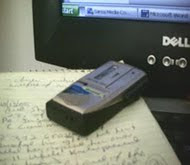I've never been good at headlines. Headline writing is a a talent that few people seem to appreciate when they read a blog post or newspaper article. It can draw people into a story, turn them off, intrigue them etc.
But with a few exceptions offline I'm awful at writing headlines.
The writing craft itself? Unfortunately, I write for a newspaper in a community where the majority of readers are for all intents and purposes are functionally illiterate. One older man has asked me more than once to write up a letter to the editor on one issue or another and sign his name, but he wants me to write it. I've read other letters to the editor that we've gotten. Not that I don't get lazy or slip up on and offline. Online it's pure laziness and rapid typing (horrible typist). Offline is another matter. The person typically responsible for editing letters to the editor, articles, will totally disregard corrections or make her own "corrections." Corrections that turn an otherwise well-written article into a hot mess.
And yet for some reason my police blotter column is popular and has been recognized (favorably) by a lot of people, including the largest mainstream media here. I am baffled. I simply go through three to four page police reports, condense them into two or three paragraphs and call it a day. Yes, I do quote criminals. Why give credence to the words of a criminal? Their statements are insightful and really put things into context. Not to mention being funny as hell at times.
Other times, though, the police reports are agonizing to even read. I was going through the reports last week and a young officer brought in an arrest card for an arrest he just made--three counts of endangering the welfare of a child. Three kids (under the age of five) were left alone in an apartment reeking of feces. There was not one piece of food in the house. The kicker? Police found WIC coupons on the table (state issued coupons issued to provide nutritious food to pregnant women, infants, and children. WIC is apparently different from food stamps since only specific, nutritional food can be purchased with them).
In this case, the mother received the WIC coupons a week earlier and hadn't bought her kids food in a week.
This sweet young officer went on to describe the crime, prefacing his next statements with, "I hate to even mention it to you," was the disgusting object found next to a baby who was strapped in a stroller. The officer knew the crime had to be reported but said, "I know you can clean it up." A few thoughts--gratitude that there remain men in the world who are sensitive about discussing such things in front of women.
The crime itself? I don't have to explain my thoughts about it. My response is the same as just about everyone else that learned about it.
Even when I clean police reports up because they are just too graphic and disturbing to print, there is still sufficient detail to cause public outcry. But that doesn't happen.
I am still waiting for a letter of outrage over a homeless man that was burned on the rail road tracks, or any of the other atrocities the homeless are subjected to on the tracks. Then again, I was up there with a homeless advocate. I saw the little camp, the makeshift stove, the little chair, the burned down tent...When you're on the tracks the only thing you can hear below is the sound of traffic. Then there's the general creepiness of rail road tracks in general. That's hard to describe.
In 13 years that single story has haunted me more than any other. The rail road tracks, the smell of the smoke...it's the only story I have ever had a nightmare about.
I would suppose such vivid and disturbing nightmares come from not only being at a crime scene but also from reading the stark police reports, before they've been cleaned up so as not to shock the public. But...there remains enough horror in even the cleaned up newsreports to shock and enrage people.
There is a classic scene in the Canadian movie Ticket to Heaven. Nick Mancuso gets tricked into a religious cult. Long story short, Nick (David) is totally brainwashed, and isolated from his family. His family hires a guy to deprogram him. Consider it a reverse form of interrorgation. Initially, the tactics instill fear and intimidation. Why not just confront Nick/David with the lies and facts about the "church"?
The deprogrammer explains, "In order to get him to think, I've got to get him to feel. Fear is primal."
Eli Wiesel said as much in the introduction to the most recent edition of Night. He explained that some thoughts are simply too personal, or conflicted but the facts remain the brutal facts, which is why his novel is short but so incredibly powerful. Fear, feel, think.
Fear is primal...fear should cause people to feel and ultimately think. Sigh. That doesn't seem to be the case anymore. Even with cleaned up media reports of the horrors in the world.
Sunday, September 25, 2011
Cleaning Up The Horror




"headlines are tough because they have to sum up too much, but as you've said, the contents are often tougher"